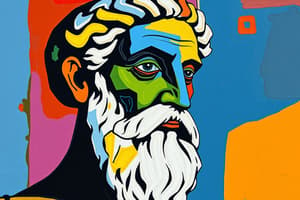Podcast
Questions and Answers
How is the self viewed in Buddhism?
How is the self viewed in Buddhism?
- The self is an individual independent from society.
- The self is a permanent and unchanging entity.
- The self is not permanent and constantly changing. (correct)
- The self is a manifestation of the Tao.
What does Confucianism emphasize about the self?
What does Confucianism emphasize about the self?
- The self is deeply embedded within family and society. (correct)
- The self is the same as the Tao.
- The self strives for material success.
- The self is an independent entity.
What key aspect distinguishes Eastern concepts of self from Western ones?
What key aspect distinguishes Eastern concepts of self from Western ones?
- Eastern views focus on independence rather than interdependence.
- Eastern views prioritize collectivism and harmony with the universe. (correct)
- Western views promote cyclical life over linear achievements.
- Eastern views emphasize individualism over collectivism.
What are the stages of cognitive development according to Jean Piaget?
What are the stages of cognitive development according to Jean Piaget?
What is the primary focus of Harter’s Self Development Concept?
What is the primary focus of Harter’s Self Development Concept?
What is the main focus during the Medieval Period of philosophy?
What is the main focus during the Medieval Period of philosophy?
Which philosopher is known for the Allegory of the Cave?
Which philosopher is known for the Allegory of the Cave?
According to Socrates, which of the following is NOT one of his key beliefs?
According to Socrates, which of the following is NOT one of his key beliefs?
What does 'cogito ergo sum' translate to in English?
What does 'cogito ergo sum' translate to in English?
Which of the following concepts is associated with David Hume?
Which of the following concepts is associated with David Hume?
Which structure of the mind is NOT one of Sigmund Freud's proposed components?
Which structure of the mind is NOT one of Sigmund Freud's proposed components?
What characterizes the Post-Modern Period in philosophy?
What characterizes the Post-Modern Period in philosophy?
Which mnemonic represents the concepts associated with the self in Western thought?
Which mnemonic represents the concepts associated with the self in Western thought?
Flashcards are hidden until you start studying
Study Notes
Definition of Philosophy
- Philosophy comes from the Greek words "philos," meaning "love," and "sophia," meaning "wisdom."
- It encompasses the love of wisdom.
4 Periods of Philosophy
- Ancient Classical Period: Focused on the cosmos (cosmocentric), exploring concepts of change and permanence.
- Medieval Period: Centered on God (theocentric), emphasizing the relationship between faith and reason.
- Modern Period: Focused on human beings (anthropocentric), prioritizing reason and senses.
- Post-Modern Period: Lacked a central focus, emphasizing plurality and particularity.
Ancient Classical Period
- Socrates: Known for the Socratic method, a technique of seeking truth through persistent questioning.
- Key Beliefs:
- The immortal soul
- Virtue and happiness
- Self-knowledge
- The difference between the visible world (physical, changeable) and the invisible (eternal, unchangeable) nature of the soul.
- Key Beliefs:
- Plato: Known for the Theory of Forms, proposing that the physical world is merely a shadow of the true reality.
- Tripartite Soul: Consists of three parts:
- Appetitive: Represents desires and appetites.
- Rational: Represents reason and logic.
- Spirited: Represents emotions and courage.
- Allegory of the Cave: Illustrates the difference between the world of appearance and the world of reality.
- Tripartite Soul: Consists of three parts:
Modern Period
- Rene Descartes: Often called the father of modern philosophy, emphasizes rationalism.
- "Cogito ergo sum": Meaning "I think, therefore I am."
- Mind-Body Dualism: Separates mind (immaterial) from body (material substance).
- The mind is considered constant and unaffected by time, while the body changes.
- David Hume: Emphasizes empiricism, suggesting that knowledge originates from sensory experience.
- Criticized Descartes' view of a constant self.
- Bundle Theory: Proposes that the self is a collection of impressions and experiences.
- Impressions are stronger than ideas.
- Passion (feelings) can influence actions.
Post-Modern Period
- Sigmund Freud: Known for psychoanalysis, dividing the structure of the mind into:
- Id: Operates on the pleasure principle, seeking immediate gratification.
- Ego: Operates on the reality principle, mediating between the Id and reality.
- Superego: Represents societal norms and morals.
- The Unconscious: Contains repressed memories and socially unacceptable desires.
The Concept of Self in Western Thought (Frank Johnson)
- AMIM (Mnemonic):
- Analytical: Views the self as an observer separate from external objects (me vs. others).
- Monotheistic: Models the self after a unitary, omnipotent being (God).
- Individualistic: Defines the self through self-expression and self-actualization.
- Materialistic: Emphasizes physical reality.
Eastern Concept of Self
- Hinduism: The self is a part of Brahman (ultimate reality). One's journey involves recognizing Brahman within oneself and others.
- Buddhism: The self is not permanent and constantly changing.
- Confucianism: The self is not an individual entity but deeply embedded within family and society, emphasizing societal roles.
- Taoism: The self is one of the countless manifestations of the Tao (the way).
- Chuang-tzu: Emphasizes self-transformation to achieve harmony with nature and society.
Key Cultural Differences
- Western:
- Individualism: Emphasizes independence, personal freedom, and uniqueness.
- Linear View of Life: Focuses on external achievements and rational problem-solving.
- Emphasis on Material Success:
- Eastern:
- Collectivism: Emphasizes interdependence, family, and community relationships.
- Cyclical View of Life: Focuses on spiritual growth and harmony with the universe, often using spiritual practices like meditation and self-reflection.
What is Psychology?
- The Study of Human Behavior, Thought Processes, and Emotions.
Jean Piaget's Cognitive Development Theory
- Suggests that cognitive development is influenced by both biological maturation and experiences in the environment.
- Schema: A mental framework that helps organize knowledge and experiences.
- Adaptation: The process of adjusting schemas in response to new experiences.
Stages of Cognitive Development (Piaget)
- Sensorimotor Stage (0-2 years): Infants learn through senses and motor actions.
- Pre-operational Stage (2-7 years): Children develop symbolic thinking and language but lack logical reasoning.
- Concrete Operational Stage (7-11 years): Children develop logical reasoning skills and can think concretely.
- Formal Operational Stage (12+ years): Individuals develop abstract thought and hypothetical reasoning.
Harter's Self Development Concept
- Dr. Susan Harter: Examines how self-concept evolves in different life stages:
- Early Childhood
- Middle Childhood
- Adolescence
- Emerging Adulthood
William James
- Introduced the concept of:
- The "I" Self: The self that is aware and reflective.
Studying That Suits You
Use AI to generate personalized quizzes and flashcards to suit your learning preferences.




